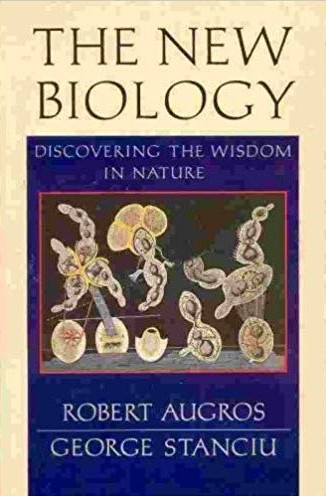|
home | what's new | other sites | contact | about |
||||||
|
Word Gems exploring self-realization, sacred personhood, and full humanity
Augros & Stanciu's George Stanciu, PhD, theoretical physics
return to "Evolution" main-page
Editor's note: The following is from Augros & Stanciu's The New Biology, chapter six, "Origins."
The way nature acts right now does not agree with Darwin’s premises, but does the history of life, perhaps [agree]? Darwin himself recognized that the fossil record does not support gradualism. But instead of changing his theory, he argued that the geological record was incomplete and unrepresentative. Paleontologist Eldrige puts it bluntly: Darwin’s discussion of the “imperfections of the geological record is one long ad hoc, special-pleading argument designed to rationalize, to flat-out explain away, the difference between what he saw as logical predictions derived from his theory and the facts of the fossil record.” Darwin had no reason independent of his theory for claiming the fossil evidence to be unrepresentative. Today, more than one hundred years later, the fossil record, much more complete and much better understood, still contradicts gradualism… Heribert Nilsson of Lund University, Sweden, after 40 years’ evolution experience writes, “It is not even possible to make a caricature of evolution [i.e., Darwinian gradualism] out of paleobiological facts. The fossil material is now so complete that … the lack of transitional series cannot be explained by the scarcity of the material. The deficiencies are real, they will never be filled.” This is not to say that gradualism never occurs among fossils. It does. But the changes are trivial, often reverse themselves, and even when added up over millions of years, do not produce new species. “Gradual change… never seems to get anywhere… The change amounts to a within-species historical trend,” writes Eldredge. Nor does the fossil record support Darwin’s assumptions of competition. He thought that through natural selection “new varieties continually take the place of and supplant their parent-forms.” He conceived of one species driving out another … by occupying the same space. But the fossils say otherwise. New species typically appear suddenly in the fossil record and persist alongside the progenitor, often for several million years. There is no gradual change of one into the other, no replacement. This hardly argues competition. It suggests rather the peaceful coexistence discussed [in the chapter on “cooperation”]. Supporters of Darwin Offer a Defense … First, many neo-Darwinians concede that nature is not competitive now but attempt to explain present cooperation as the result of prior competition and the elimination of unviable strategies. Apart from the implausibility of trying to derive a thing from its contrary, their procedure posits an unevidenced state of nature in the remote and unobservable past. How do defenders of neo-Darwinism answer the charge that no gradualism is found in the fossil record? … [They] maintain that gradualism occurs in periods too short for us to observe in the fossil record. No reason is given as to why the gradualism takes place only when we cannot see it. Again, the theory takes refuge in the unobservable… The untestable and unobservable appear in many other forms in natural selection theory… Patterson writes: “No matter how many cases fail to yield to a natural selection analysis, the theory is not threatened, for it can always be said that these failures of selection theory are explained by genetic drift [essentially based upon the principle, ‘small differences in fitness are effective agents of evolutionary change, yet differences of that order are not detectible in practice.’] ... The defenders of natural selection have insulated it from criticism by pushing it away from the facts into the realm of the unobservable… [resulting in] an unverifiable, unfalsifiable theory… There are two ways to adjust a theory with respect to observations that contradict it [one way is honest and the other is dirty politics]. One is to change something in the substance of the theory, to modify it to fit the new facts, to change a basic assumption to its opposite, or, if necessary, to abandon the theory for a completely fresh approach. [This would be the reasonable approach. However] … Another way to modify a theory in the face of observations that contradict it is to make no change in the substance of the theory but rather to place the theory’s claims beyond the limits of our capacities of observation. Recast the theory so that it will have no testable results in the area of the contradicting observations. This makes it impossible to compare the theory with the facts… This is not the direction of good science but of stagnation and obscurantism… [it] does not serve the cause of truth… Ironically, these are the very criticisms [of doctrinaire, intransigent belief] that [Darwinists] make of creationism [claiming that creationism is for the simple-minded]…
|
||||||
|
|


